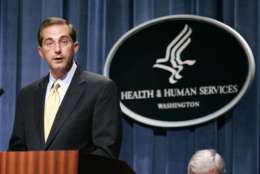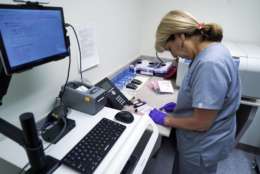Department of Health and Human Services
-
According to a new HHS report, chemicals in fire-fighting foam used by the military have been linked to thyroid diseases and liver damage.
June 25, 2018 -
The Senate Appropriations Committee cleared a bill to give federal civilian employees a 1.9 percent pay raise in 2019.
June 22, 2018 -
After a year and a half of study, the White House rolled out what it says would be the most ambitious restructuring in the federal government’s history.
June 22, 2018 -
In today's Federal Newscast, over 30 veterans service organizations asked Senate and House Veterans Affairs leadership to help secure specific funding for the VA MISSION Act.
June 21, 2018 -
Lawmakers want to know what the Health and Human Services Department is doing with its cybersecurity coordination center, but HHS isn't volunteering much information.
June 20, 2018 -
At this month's ATARC Cloud & Data Center Summit in Washington, D.C., David Nelson of the Nuclear Regulatory Commission and Todd Simpson gave their outlooks on cloud migration.
June 19, 2018 -
HHS' Office of Inspector General is giving its agents on-the-ground a chance to tell their stories, in their own words.
June 18, 2018 -
Sandeep Patel, open innovation manager and KidneyX project director, joined Federal Drive with Tom Temin to share more details.
June 18, 2018 -
In today's Federal Newscast, a whistleblower and the Office of Special Counsel said inspectors with the Federal Aviation Administration cleared planes for take off even though they did not have all of the needed safety information.
June 18, 2018 -
But even if the ACA disappeared, the government would still have a giant footprint in health and disease research. The National Institutes of Health's annual budget and what the Centers for Medicare and Medicaid Services pays out for kidney dialysis both equal about $35 billion.
June 15, 2018 -
Former Defense Secretary Carter Ash has shot down proposals suggesting the creation of a sixth military service devoted to space.
June 08, 2018 -
Around this time last year, when hospitals and healthcare providers were dealing with the WannaCry malware virus, Steve Curren sprang into action.
May 25, 2018 -
Jonathan Sullivan, a digital services expert at the U.S. Digital Service, said modernizing the Quality Payment Program for CMS required a change in approach.
May 10, 2018 -
With managed services, agencies such as the departments of Agriculture, Commerce, Defense, Homeland Security area sharing overhead, surge capacity and costs for their help desk services.
May 08, 2018 -
Patient portals typically only offer a fraction of personal health information, presenting a common challenge for people accessing their data.
April 30, 2018















